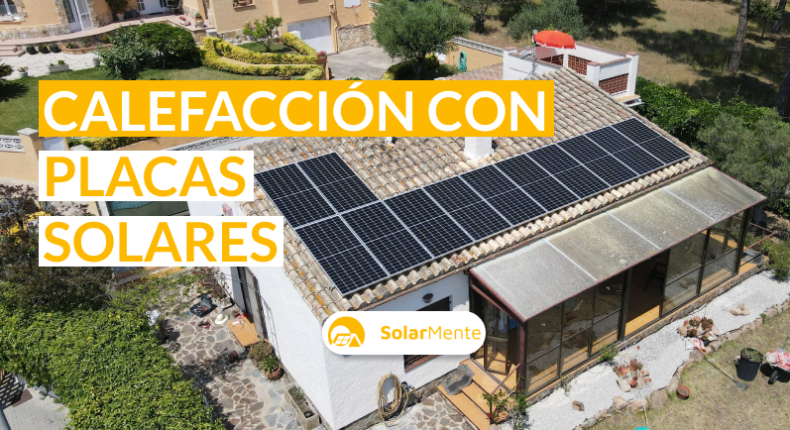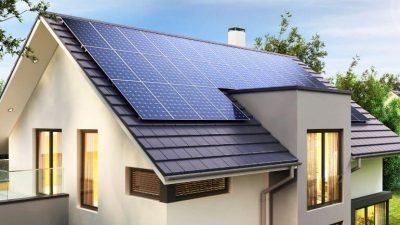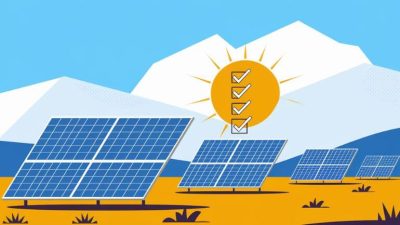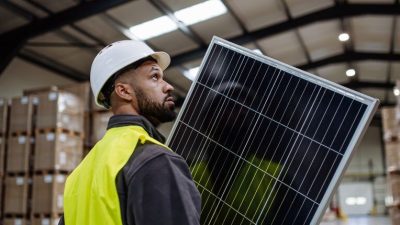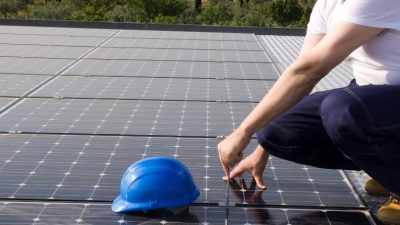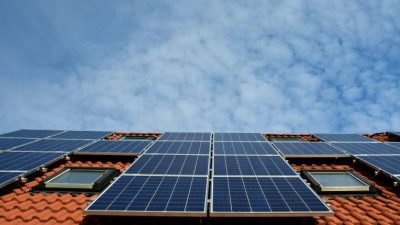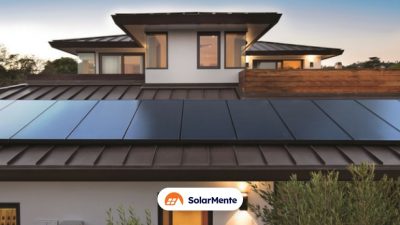Did you know that photovoltaic panels can be used to heat your home and save up to 55% on your electricity bill?
Every winter, natural gas in heating accounts for 60% of total consumption, according to IDAE data, making it one of the highest costs in household energy expenditure.
Given that 32% of energy comes from household consumption and emits a fifth of greenhouse gases, why not use solar energy to heat homes?
Heating with solar panels is a good alternative to reduce environmental pollution and increase our economic savings. This is an option that is gaining more and more strength in Spain.
Therefore, in this article we are going to explain:
- The operation of heating with photovoltaic energy
- What uses can be made of solar heating
- What are the existing types of installation
- The benefits of using a photovoltaic heating system
How does heating with solar panels work?
Solar heating is a system that produces energy by means of a solar installation for hot water and heating.
There is one detail to bear in mind. Solar energy can be thermal or photovoltaic. The technology used is different and, therefore, the operation varies from one installation to another.
In this case, we can use the heating from our photovoltaic or thermal solar panels.
We tell you how each process works.
Heating with thermal panels
Solar thermal panels are responsible for heating a fluid located in the modules within an internal hydraulic circuit, which are called collectors and their function is to store the heat from the sun.
This liquid then absorbs the heat and transports it to an accumulator, where it circulates through a spiral-shaped pipe. In this way, the fluid heats the water that will later be used for hot water (DHW) or heating.
Heating with photovoltaic solar panels
This heating system converts solar radiation into usable electricity by transforming direct current into alternating current.
In this way, we can use the energy produced by our solar panels for all kinds of appliances such as electric water heaters, air conditioning or heat pumps that provide heating and domestic hot water (DHW).
Both technologies will not cover 100% of your energy consumption and heating needs, but you will achieve a 50% reduction in your gas bill thanks to the use of a renewable and clean energy that allows you to save on costs.
What can we use solar heating for?
Solar energy has established itself as one of the most popular and fastest growing renewable sources for home and business heating.
Its versatility is so wide that it offers a multitude of advantages for different areas.
These include:
- Heating. Heating your home with underfloor heating has become one of the most efficient and sustainable alternatives. If we add a photovoltaic installation, the bill could be reduced by up to 60%.
- Domestic hot water. By means of our solar panels we can produce energy for hot water consumption, either through thermal or photovoltaic modules using heat pumps.
- Air conditioning. The use of this electrical appliance has a significant cost in the summer months. Solar panels help us to reduce this significant energy cost, which we will see at the end of the month in our electricity bill.
- Swimming pool climate control. You can heat the water temperature with solar modules. It is a high expense that we can reduce with the use of solar energy.
How to heat a house with solar panels? 3 types of solar heating systems
Heating a house with solar panels to increase savings and reduce the negative impact on the environment is possible by using a clean and economical source of energy from the sun.
A photovoltaic system can be used to power an electric heating system.
We show you three heating installations with solar energy:
- Heating by accumulators
- Heating with heat pumps
- Other electrical systems
Heating with electric storage heaters
Storage heaters differ from conventional radiators in the way they store heat. While the radiator needs to consume electricity to generate heat in the home, the storage heater has the great advantage of storing the heat at specific times and gradually releasing it.
In short, the accumulators have the capacity to achieve maximum production at specific times in order to dose the heat throughout the day, even at night if we do not want to depend on the conventional network.
Heat pump heating
Perhaps heating with solar panels using heat pumps is one of the first options to consider thanks to its high efficiency, achieving significant energy savings of 75% compared to traditional systems.
How does this method work?
Well, the energy is extracted from the outside via a reversible heat pump and sent to the corresponding air conditioning system, be it radiators, underfloor heating or a water heater.
This concept is known as aerothermics and requires specific outdoor equipment, in the same way as air conditioners.
In addition, it has another peculiar feature that makes it a relevant factor. If the system has a reverse cycle, the energy from the panels can be used for both heating in winter and air conditioning in summer.
Aerothermal heating requires a high initial outlay, but allows considerable savings over the lifetime of the installation, generating up to three times more heat for the same electricity cost.
Heating with cookers and other electrical systems
There is a third option that produces heat by means of resistance heating such as cookers or radiators, reducing the costs of using these electrical appliances since, once in operation, they require a great deal of energy consumption.
Thermoelectrics and radiators require the least investment, but in the long run they cost more due to lower efficiency.
What are the benefits of using solar heating for a house?
Solar panels have a variety of uses and applications, not only for powering home electronics and lighting, but their benefits extend to heating and hot water.
In order to reduce greenhouse gas emissions and cope with high fuel prices, new ways of harnessing solar energy and renewable energy waste are being explored.
Among them, solar heating is an alternative to consider for the following benefits:
- It is an inexhaustible source of energy.
- It does not pollute and reduces the impact of the greenhouse effect, as well as slowing down climate change.
- It is suitable for isolated areas in temperate climates.
- It requires almost no maintenance.
- Increases economic savings by using energy from the sun through solar panels.
- Decreases energy consumption promoted by a reduction in heating and hot water costs.
How many solar panels are needed to heat a home?
There is no exact answer to this question for the simple reason that the size of each house is different, as is the energy consumption of each household.
Our recommendation is, first of all, to check how much a solar panel installation can save you in terms of the energy consumed each month.
Then, ask for information from professionals in the sector to advise you on the best options to meet your needs.
Conclusions
Heating with solar panels can achieve an interesting synergy that can further reduce energy costs during the colder seasons by maximising the performance of your PV system.
Even the combination with a solar battery increases independence from the grid. The energy generated can also be stored for use in unexpected situations such as blackouts.
It is becoming increasingly common to find heat pumps or electric storage heaters that have a regulation system included in the modules in order to extract the maximum energy produced and supply our homes with green electricity.

